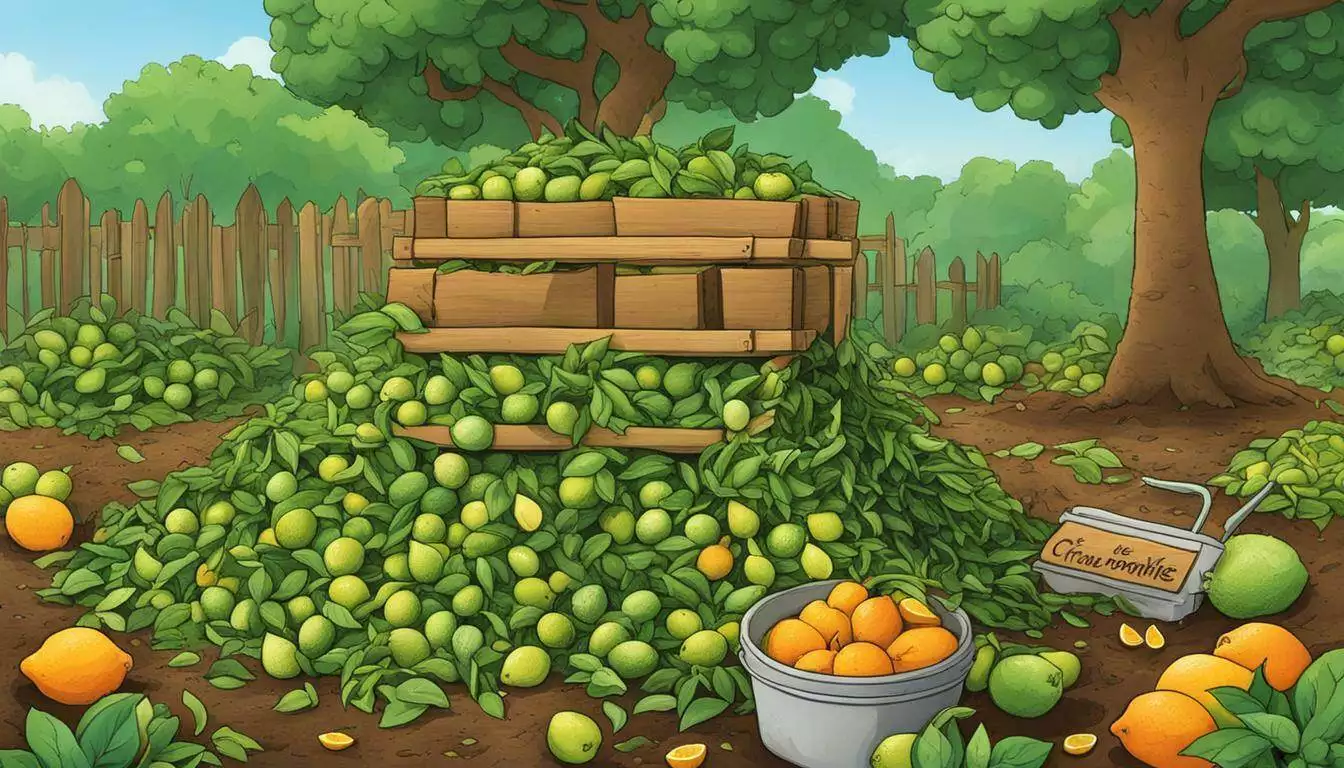Many people wonder if they can compost limes and other citrus fruits, but there is a common misconception that they should not be added to the compost bin. This outdated myth suggests that the natural chemicals or acidity in citrus peels could hinder the decomposition process or harm earthworms and microbes. However, the truth is that citrus peels, including limes, can be successfully composted without any negative effects.
Key Takeaways:
- Citrus peels, seeds, flesh, and leaves can all be composted.
- Cutting citrus peels into smaller pieces can help speed up the decomposition process.
- It is recommended to balance the amount of citrus added to the compost pile with an equal or greater quantity of “browns” (such as dry leaves or straw).
- Composting citrus will help mellow the acidity of the peels, similar to the effect of composting tomatoes.
- Chemical treatments used on non-organic citrus fruits are not a concern as they will break down during composting.
- Composting citrus is an environmentally friendly choice that enriches the soil with beneficial nutrients.
Lime Composting Tips for a Successful Compost Pile
Composting limes and other citrus fruits is not only possible but also offers several benefits for your organic waste management. Contrary to an old myth, citrus peels, seeds, flesh, and leaves can all be added to your compost bin without causing harm. While there was concern in the past about the natural chemicals and acidity in citrus inhibiting the decomposition process or affecting earthworms and microbes, this information has been debunked.
It is important to note that citrus peels may take longer to decompose compared to other kitchen waste. To speed up the process, consider cutting them into smaller pieces before adding them to your compost pile. It is also recommended to balance the citrus with an equal or greater quantity of “browns” such as dry leaves or shredded paper. This helps maintain the optimal carbon-to-nitrogen ratio and promotes efficient decomposition.
Just like other acidic products like tomatoes, citrus residues can be mellowed by the composting process. The composting microorganisms break down the acidity, making the resulting compost suitable for enriching your soil. Even citrus peels that have been treated with non-organic chemicals are not a concern as the composting process breaks down any residues, rendering them harmless.
By composting citrus, you not only divert these organic wastes from the landfill but also create nutrient-rich compost that can be used to nourish your plants and garden. The composting process breaks down the organic matter, releasing valuable nutrients and beneficial microorganisms that enhance soil health. This ultimately leads to stronger, healthier plants and a more sustainable approach to waste management.
Conclusion
Composting limes is a sustainable and beneficial practice that can be easily incorporated into your organic waste management routine. Contrary to an old myth, citrus peels, including limes, can be composted without any detrimental effects on the decomposition process or the beneficial earthworms and microbes in your compost pile. Although citrus peels may take longer to break down compared to other kitchen waste, you can expedite the process by cutting them into smaller pieces.
It is important to balance the addition of citrus peels in your compost pile by adding an equal or greater quantity of “browns,” such as leaves or shredded paper. This will help maintain the optimal carbon-to-nitrogen ratio for efficient decomposition. Additionally, you can further enhance the composting process by regularly turning your pile to ensure proper aeration and moisture distribution.
Don’t be deterred from composting citrus due to concerns about acidity. Citrus residues, just like products like tomatoes, will naturally mellow their acidity during the composting process. Even if the citrus you’re composting is non-organic and has been treated with chemical sprays, these residues will break down and pose no harm in the final compost product.
Composting citrus, including limes, not only diverts organic waste from landfills but also enriches your compost with valuable nutrients. The resulting compost can be used to fertilize your garden, improving soil health and promoting the growth of healthy plants. So, go ahead and embrace composting limes as an environmentally friendly choice that benefits both your garden and the planet.
FAQ
Can I compost limes?
Yes, you can compost limes. Contrary to an old myth, citrus peels, including limes, are suitable for composting. They will decompose and add beneficial nutrients to the soil.
Will the acidity in citrus peels harm my compost pile or earthworms?
No, the concern about the acidity in citrus peels harming the composting process or earthworms is outdated. Citrus peels, seeds, flesh, and leaves can all be composted without causing any harm.
How long do citrus peels take to decompose?
Citrus peels may take longer to decompose compared to other kitchen waste. However, cutting them into smaller pieces can speed up the decomposition process.
How can I balance the acidity of citrus peels in my compost pile?
To balance the acidity of citrus peels, it is recommended to add an equal or greater quantity of “browns” to your compost pile. Browns include materials like dry leaves, sawdust, or shredded paper.
Are chemical treatments on non-organic citrus a concern for composting?
No, chemical treatments given to non-organic citrus are not a concern for composting. The composting process will break down any residues, making them safe for use in the garden.
Is composting citrus environmentally sound?
Yes, composting citrus is an environmentally sound choice. It not only reduces food waste but also adds valuable nutrients to the soil, promoting healthy plant growth.

